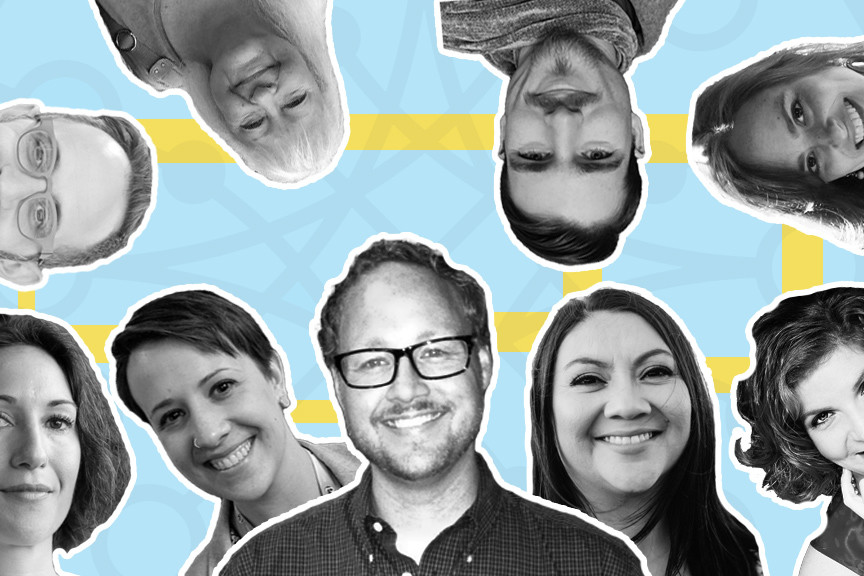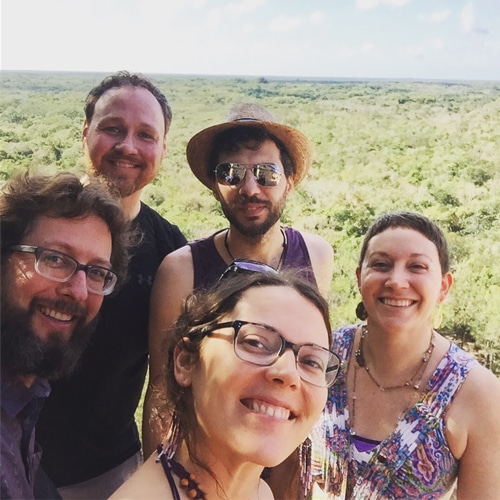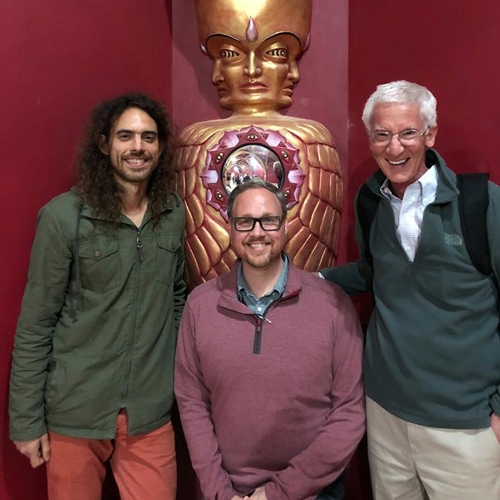Finally, there’s a group giving grants to students researching psychedelics
We talked with Johns Hopkins psychedelic researcher, Alan Kooi Davis, about the Source Research Foundation, a non-profit awarding grants to students researching psychedelics.

Psymposia is a 501(c)(3) nonprofit research and media organization that offers critical perspectives on drugs, politics, and culture. We rely on contributions from our readers and listeners. Your support is vital to sustaining Psymposia.
Support Psymposia’s independent journalism on Patreon and help us drive the Mystery Machine! We’re a bunch of meddling kids who are unmasking the latest shenanigans on the psychedelics beat.
The text read “made it to cancun. pick up for pyramids is 7am tomorrow! i’ll bring zucchini bread.” I reluctantly stumbled out of bed on only a few hours sleep. Yuck. I was in Tulum, Mexico. Beautiful. Katherine MacLean, a former researcher at Johns Hopkins, turned farmer, had arranged a tour of the Mayan pyramids at Cobá. The van was almost here. Coffee first. Please.
I climbed into the van and met Alan Kooi Davis, a psychedelic researcher at Johns Hopkins Behavioral Pharmacology Research Unit. For the next few hours, as we walked the forest ruins, and drove back to our Airbnb in Tulum eating zucchini bread, we talked about the state of psychedelic science. We focused on issues that affect the community, and social questions about psychedelic science rather than the science itself. Personally, I believe we should be talking more about these issues, so I found the conversations quite refreshing.
Alan recently shared a post from Source Research Foundation (SRF), which awards grants to students researching psychedelics. SRF didn’t come up during our pyramid adventure, but I did remember hearing about it while in Mexico. I’ve been wondering for a long time when a non-profit was going to offer grants to help college students studying psychedelics, rather than pump more dollars into medical research. Spending money on medical research is necessary, but it’s insufficient for sustaining the future vitality of the field. I shot an email over to Alan to learn more about what the Source Research Foundation was up to.

So what inspired you to start Source Research Foundation?
Honestly there wasn’t anything in the space that I was aware of providing student grants for psychedelic research. Having graduated in 2016, I had recent experience of wanting to find funding to support my research at the graduate level and there wasn’t any. I remember reaching out to every possible player in that field, which was Beckley, Heffter, and MAPS at the time. When I reached out first in 2012, through 2016 when I graduated, the answer was always, “We can’t because all the money is going to the big clinical trials”. It was fine, I understood it. It was my experience that lead to thinking we need to change this. It led to asking the question: How can we change the trajectory and enhance the trajectory of students who are going to be the future leaders and investigators in this field if there’s no money to support that?
Right.
More importantly, beyond the money, which is critical, it’s about connection, inspiration, and developing a network of students and professionals. Not only helping students fund their studies, but also connecting them with professionals in the field. I feel like there’s so much that can come from these students being connected in a formal way.
What do you hope to accomplish?
It took about a year to get things up and running. During that time our vision started to expand. We’re starting off with a grants program for students. Ideally, we’d be able to provide grants that are more involved in terms of funding bigger projects for students or connecting students across institutions for collaborative projects. We believe that can expand at the rate with which we’re able to develop financial support.
We had enough funding for the first year of student grants, and we have enough for our second year which is next summer. We’re going to look at figuring out a way to go beyond that and find the support through donations, or possibly other mechanisms.
One exciting thing that we’ve been talking about is creating a community grants program. We could provide grants to non-students who are interested in psychedelic science who want to translate something about psychedelic science that they’re interested in into a community project, which could look like a thousand different things.
I was inspired recently after spending the last couple days up at COSM. It occured to me that there are all these people volunteering their time to help create that space. Wouldn’t it be really interesting if we had the capacity in this community grants program to fund an artist to go there for the summer and contribute to that space? Or maybe it’ll be a community member in San Francisco who wants to translate something from science into harm reduction; a public talk, or integration spaces. I feel like there could be so many cool things that are outside of the student and research realm that I’d love to see SRF get into. The development of that obviously depends on our capacity to become a financially viable organization in the long-term.

You’re on the right path with that. There’s a huge need for non-research projects too. To me the field is stuck in a research-only mindset.
We’re reaching a critical mass. Obviously there’s still work to be done. There’s so much money going into research, even though there’s still not the big money of government funded projects. There’s still a lot of money that’s gone into this space recently. We need to start thinking about the rest of the community and how to connect these processes. They should be dynamic and we should figure out a way for them to enhance each other. It shouldn’t just be in one direction: science to community. There should be another direction: community to science. How can we connect the processes so that people in the community can have more of a voice in science? I think that historically that’s been completely cut off, and recent developments in this research space only highlight how disparate they are right now.
I think that’s absolutely correct. It’s encouraging to hear. A lot of the points you’re hitting on are the sore spots for a lot of people. What’s the reception been like?
It’s been really positive. We’re still new so I don’t know how many people know about us yet. It’s still building. For the first year it was all talk like “Oh we’re gonna do this.”
Now that we’ve actually achieved this first grant season, we can demonstrate that we’ve done this and here are the students, “Oh, they really are doing what they said they’re gonna do.” My take on it, at least from the people I talk to about it, is that people’s reaction are like yours, “Wow this is really cool. This is needed.”
I think people are excited because of how we are going about creating the organization. We’ve attracted people on the board of directors from all areas of this field. A lot of them have been in the science community because that made sense to get started. But now we’re also looking to expand the board. We’ve recently appointed Lauren Padgett from Students For Sensible Drug Policy (SSDP) to the board of directors. We also will always have a minimum of two student members on the board of directors. As we create the community grants program we want to have equal representation from professional science, students, and community. The hope is that people from all areas can help direct the review of applications and figure out how we want to support people. I’m trying to create these bi-directional processes as part of the process.
Yes it’s good. You’re baking that into the cake instead of retroactively making changes that should have been done in the first place.
Absolutely.
What do you think about the current state of psychedelic science?
One of the things that constantly bothers me about the state of psychedelic science is the dearth of representation from women and minorities. Obviously, it’s a current issue right now, but it’s integral to an investigative career where the questions that we ask as investigators are completely determined by our own biases, from our own culture, and our own perspectives in life. That’s obviously governed by things like sex, gender, age, and ethnicity.
I’ve felt very much that not only do different parts of the community need to be communicating in these processeses, but with SRF the whole point is to try to include as many differing voices as possible in the process. We’re being very thoughtful about trying to create a space where voices can be heard; where students can get access to the resources they need, and eventually community members as well.
I feel like there needs to be an example. We don’t have any good examples right now of what it actually looks like when an organization tries to do this. At least not in this space.
Yeah I agree. I think it’s important to have diversity of thought and life experience off the bat, and to be open minded and have differing opinions. I’ve seen a lot of monolithic thought in this psychedelic mainstreaming process. It seems a lot of decision-making tends to be left to an individual or an individual surrounded by people with very similar points of view. That’s my experience anyways.
That’s definitely been my experience as well, which is something that I’m struggling with a little bit; how to be a voice, and I guess a representative, of SRF but at the same time recognizing that’s not the structure we’ve created. There’s a legal, mandated structure of how organizations operate that have to involve a hierarchy, but trying to cultivate an atmosphere where it’s more inclusive than the hierarchy required by law. For example, Brooke Arterberry, our Vice President, will be representing SRF at the Women’s Forum in Psychedelics at CIIS in November, and Dawn Davis and Rafel Lancelotta recently helped represent SRF at several conferences. We want as many of our board members as possible to feel ownership over the creation of our work.
What students should apply?
Any student! We’ve had mostly graduate students apply in our first round. We did have a couple undergraduate students apply, which surprised us. We assumed it would be mostly graduate students. Clearly there’s undergraduate interests. We want it to be open. It’s open to any field people are studying. We’ve had everything from anthropological programs, to clinical psychology programs. We had one in a mix of psychology and music. The four people we ended up funding were a mix of clinical psychology and anthropology, but we don’t think that things need to be limited to that. We’d like to get the word out to people in neuroscience, or basic clinical labs. We don’t want to discriminate any field of this work, wherever students are at. We want to be as encompassing as possible.
What grants have you awarded so far?
We have awarded four grants this year.
The first is a master’s student studying medical anthropology. She’s really interested in looking at ibogaine-assisted addiction treatment; in digging into the qualitative phenomenology of ibogaine-assisted addiction therapy, and looking at the actual treatment that occurs, but then also looking at the after-care processes and seeing what happens after treatment and how people are supported. What comes next after that? She’s going to be connecting with both the actual clinic where the treatment is done, as well as an after-care clinic, where people can connect post ibogaine.
Another student is looking at a long-term follow-up of the NYU cancer trials. She’s following up with all of the people who were in the cancer study to ask about the long-term effects of psilocybin treatment. That’s exciting because we have limited information about how that affects people long-term.
Our third grant went to a student who’s doing a prospectus study where he’s looking at ayahuasca effects on personality in people who use ayahuasca in ceremonial spaces. He wants to see if personality changes over the course of using ayahuasca in ceremony. If it does in what ways does it change?
The fourth student is looking at ayahuasca-assisted therapy for mental health, but she’s interested in the processes that are being used in Peru, and how people with mental health issues are coming down there to be treated through ayahuasca-assisted therapy. So she’s looking at different components of that question by talking to providers, people involved in the treatment, as well as the people going through the treatment to see the dynamic interactions between the providers and patients. How does that look in terms of people’s outcomes?
All four students are doing cool things that are otherwise unknown to the scientific community right now. Not only were we surprised at the cool things these students were doing, but we were surprised that they were doing them at the universities they’re at. We had not previously associated that there were any psychedelic things going on at those universities. “Oh my gosh wait a second. There apparently are universities and faculty members who are quite supportive of students doing psychedelic studies!” It spoke to the fact that in the next couple of years we’re going to see a lot more institutions pursuing these topics and looking at more nuanced topics both in and outside of the clinical utility question.
We hope that as that happens we can start to network with even non-clinical studies. There have to be programs where people are starting to spend more time examining consciousness and spirituality from a ‘healthy’ perspective.
I would love to see the field move more into consciousness studies. More weirdo studies. Not the paranormal, but something other than healing or medicine.
Yeah really. Haha. Absolutely.
No 5-MeO grants yet?
Nobody applied. That’s something personally of interest to me, so yeah, that’d be great. I’d be excited about people who might want to study things that aren’t on the radar right now, like you’re talking about, or substances that aren’t well understood.
SRF came together because Joseph Barsuglia, Rafael Lancelotta, and I came together to do a 5-MeO study virtually from three different places in the country. It sparked this idea that maybe we could do this in a formal way with students. We’re definitely continuing to create those processes.
We’ve got another study starting right now with Dawn Davis from the Native American Church, who’s on the board of directors of SRF. We connected with researchers in the Netherlands and in the Czech Republic. We’re replicating the 5-MeO survey, but with people who ingest mescaline, and we’re going to look at people who use peyote, san pedro, and synthetic mescaline, and compare the effects. We don’t know a lot about people who use peyote. We’re really hopeful that we can inspire students to start thinking about all of the things we don’t know yet about these molecules.
On your homepage you make it clear that you support the Statement on Open Science. Why is this important to you?
That’s important to me because I believe very strongly that there’s more to this work than personal gain and notoriety in this space. I don’t think that that’s consistent with the actions and values I’ve seen from other organizations. My guiding value in all of this–whether it’s personal or professional–my consistent value is connection and pursuing the good through that connection. By definition, connection is open and inclusive and inherently curious.
Source Research Foundation (shown in featured image) is: Alan K. Davis, PhD., Mariana M. Cajaiba, MD., Joseph P. Barsuglia, PhD., Lynnette A. Averill, PhD., Dawn A. Davis, MS, Brook J. Arterberry, PhD., Lauren Padgett, Rafael L. Lancelotta MS., and Kathleen A. Davis.
Hey! Before you go… Psymposia is a 501(c)(3) non-profit media organization that offers critical perspectives on drugs, politics, and culture. We strive to ask challenging questions, and we’re committed to independent reporting, critical analysis, and holding those who wield power accountable.
Our perspectives are informed by critical analysis of the systemic crises of capitalism that have directly contributed to the unmitigated growth of addiction, depression, suicide, and the unraveling of our social relations. The same economic elite and powerful corporate interests who have profited from causing these problems are now proposing “solutions”—solutions which both line their pockets and mask the necessity of structural change.
In order for us to keep unpacking these issues and informing our audience, we need your continuing support. You can sustain Psymposia by becoming a supporter for as little as $2 a month.





